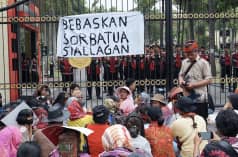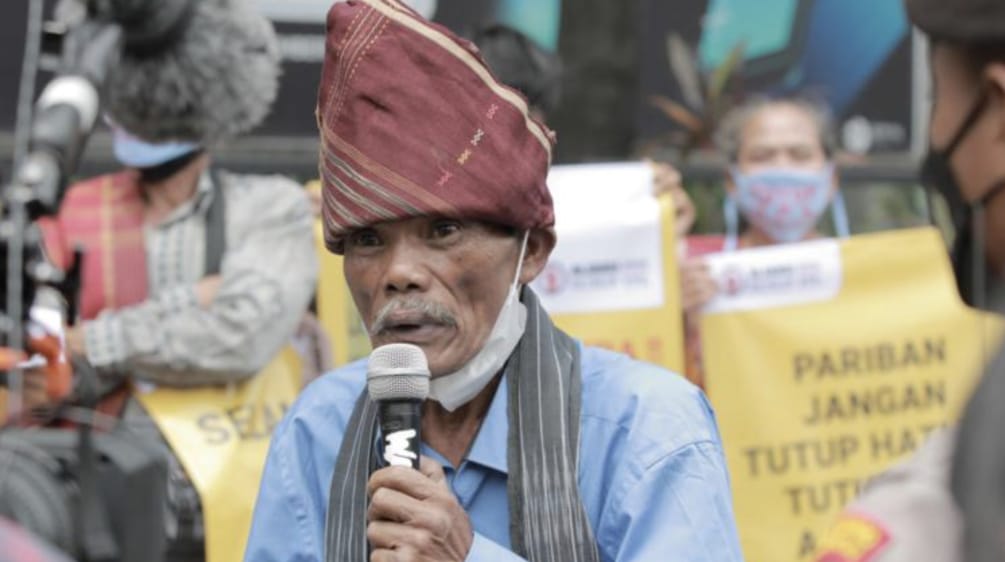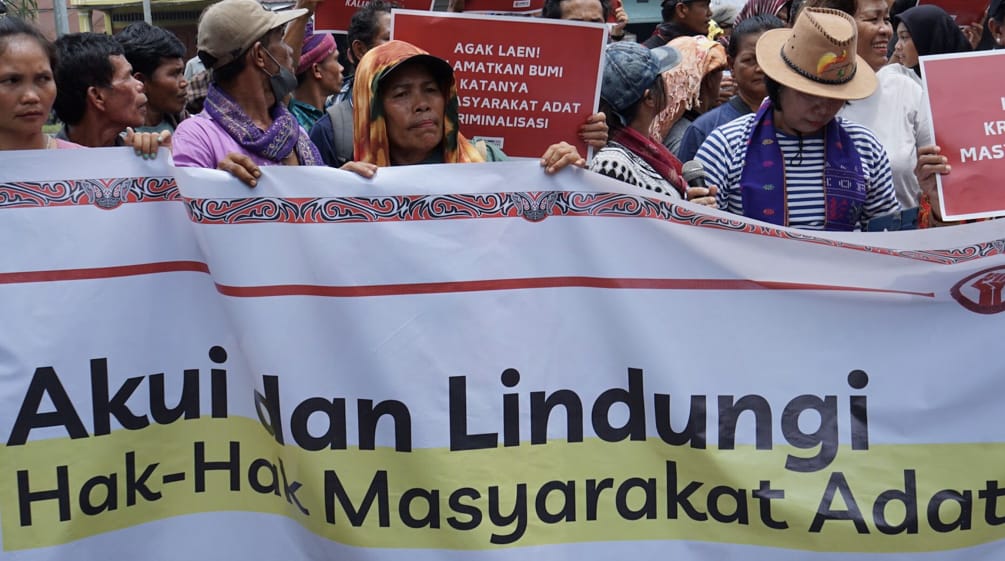Indonesia: Indigenous elder abducted for resisting the paper industry
Apr 3, 2024
Sorbatua Siallagan, an Indigenous elder on Sumatra, was abducted for wanting to keep the paper industry out of his people’s forest. Protests have been going on for days demanding the closure of pulp giant Toba Pulp Lestari.
Protesters have been gathering in front of the police building in Medan, a city of one million on the Indonesian island of Sumatra, since March 23, 2024. People are singing, holding banners and shouting “Free Sorbatua Siallagan!” – “Close down Toba Pulp Lestari!” – “Stop criminalizing Indigenous peoples!”
Sorbatua Siallagan, the leader of Dolok Parmonangan, an Indigenous Batak community, is 65 years old. On the morning of March 22, he was shopping with his wife when ten people in civilian clothes approached him, dragged him into a car and took him away without a warrant. His family and village did not know what had happened to him.
Only in the evening did they learn that Sorbatua Siallagan had been taken to a jail in Medan, 160 km away. He was interrogated without a lawyer present, said Roganda Simanjuntak of our partner organization AMAN Tano Batak (Alliance of Indigenous People in the Land of Batak) in an interview with Rainforest Rescue. Siallagan is accused of “illegal activities”. He allegedly carried out agricultural activities in a forest that was part of the concession of the pulp company Toba Pulp Lestari.
The Indigenous Batak say the land and forest are their ancestral territory, and that they have lived there for thousands of years. But for the Indonesian government, forests are state property – except for small Indigenous forests. The state grants concessions to companies without regard for centuries of settlement and traditional rights.
In the 1980s, Toba Pulp Lestari (TPL) was established south of Lake Toba, the largest crater lake in the world. TPL built plants for the production of paper, pulp and viscose and was granted a concession for hundreds of thousands of hectares of forest by the state. First, vast amounts of tropical wood disappeared into the paper mill, then fast-growing eucalyptus plantations were established – at the expense of nature and local communities.
The brutal destruction of forests, water pollution, land grabbing and violence against local people met with fierce resistance from the start. Hundreds of land disputes remain unresolved to this day.
But “Toba Pulp Lestari continues to use the police to intimidate the Indigenous people into fighting for their land,” says Hengky Manalu of AMAN Tano Batak. He suspects that the criminalization of the Indigenous leader is based on a complaint filed by Toba Pulp Lestari. This is not the first time that Sorbatua Siallagan has been arrested.
The demonstration in Medan shows both the desperation and the determination of the participants, because their very existence is at stake. The case of Sorbatua Siallagan also stands for many similar cases: the struggle of the people for their land and forest rights, their gardens and their forest. The Indigenous peoples of Indonesia are on the losing side of the race to make way for land for plantations and mines.
Toba Pulp Lestari is controlled by one of Indonesia’s richest men, Sukanto Tanoto. His Royal Golden Eagle (RGE) business empire includes the APRIL Group (Asia Pacific Resources International Limited). APRIL, one of the world’s largest pulp companies, produces paper, pulp and viscose in several large plants on Sumatra. APRIL pulp is also used in Chinese paper mills.
In response to increasing global paper consumption, especially since the COVID pandemic, APRIL/RGE is expanding into China, Europe and Latin America. The group has bought into Brazil, the facilities on Sumatran mills are being expanded, and a new mill is being built on Borneo, in the province of North Kalimantan. Another company linked to APRIL/RGE, Mayawana Persada, is currently destroying an orangutan forest for paper.
Years of negotiations with major environmental organizations have failed to change the company’s practices. Investors and buyers should not do business with APRIL/RGE.
The immense consumption of paper must stop! Rainforest Rescue stands in solidarity with the demands of the protesters in Medan:
Stop criminalizing Indigenous people and environmental defenders!
Free Sorbatua Siallagan!
Close down Toba Pulp Lestari!
The Indonesian company Toba Pulp Lestari (TPL), founded in Sumatra in 1983, is part of the pulp and paper group APRIL, which in turn is part of the global group Royal Golden Eagle. In 1989, TPL began producing pulp for paper and viscose fibers (rayon) for textiles under the name Indorayon – using tropical wood from the jungle.
TPL currently holds a concession for 265,000 hectares of rainforest and plantations – an area more than twice the size of New York City. TPL is largely responsible for the destruction of Sumatra’s rainforests. Its production facilities also pollute Lake Toba.
At the end of the Suharto dictatorship, the protest movement against Indorayon grew stronger. Under public pressure, then-President Habibie ordered the mill closed in 1999. However, under President Megawati, production resumed in 2003. Indorayon was renamed Toba Pulp Lestari.
APRIL Group (Asia Pacific Resources International Limited)
APRIL papers are sold under many brand names, the best known being Paper One.
The RAPP paper mill in Riau province, also on Sumatra, is one of the largest in the world.
Companies directly related to APRIL are based in Brazil, Macau, China, Singapore and elsewhere.
Sukanto Tanoto also controls the following companies, among others: Toba Pulp Lestari (TPL), Sateri (viscose production in China), Asia Pacific Rayon (APR).















